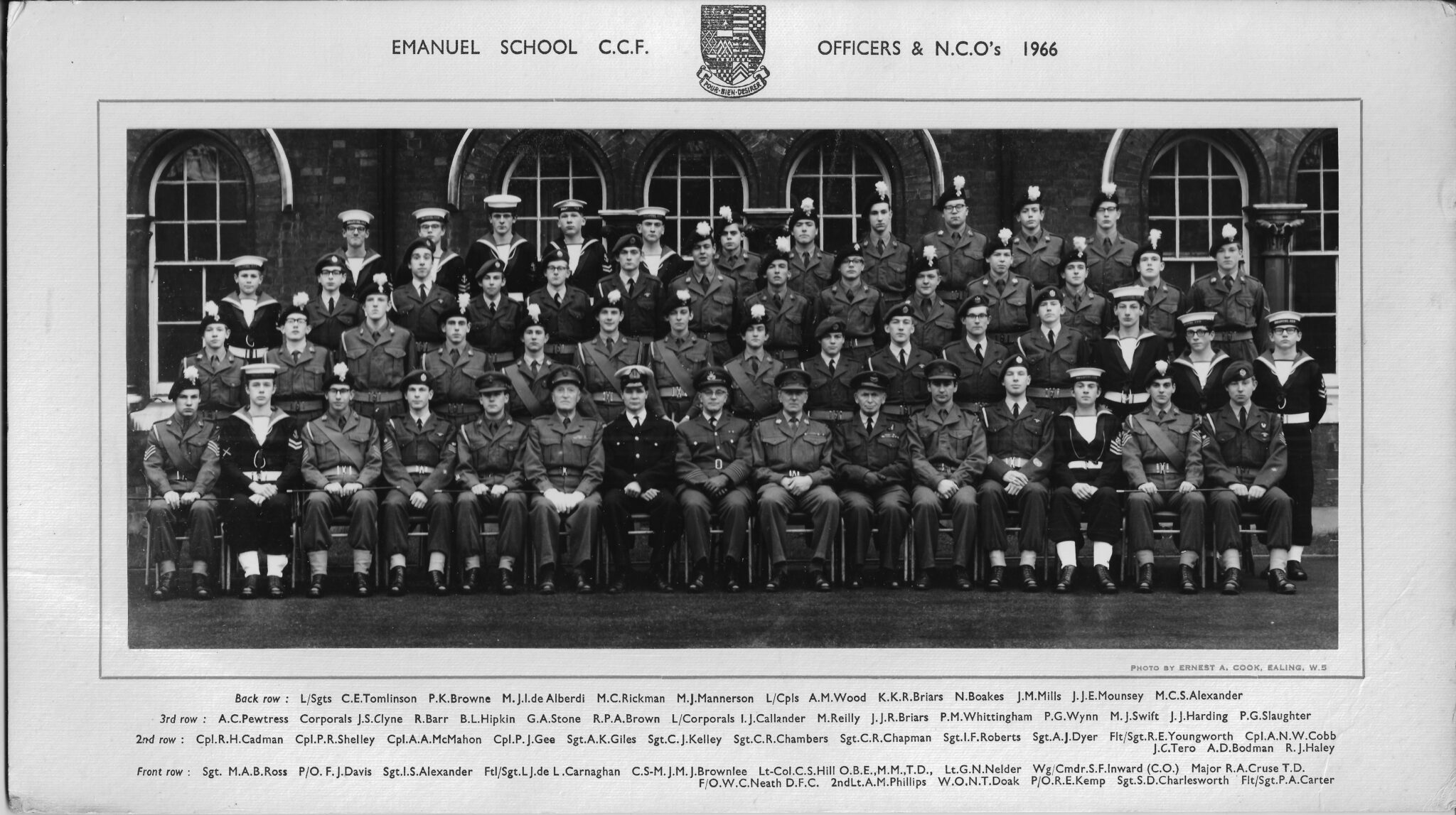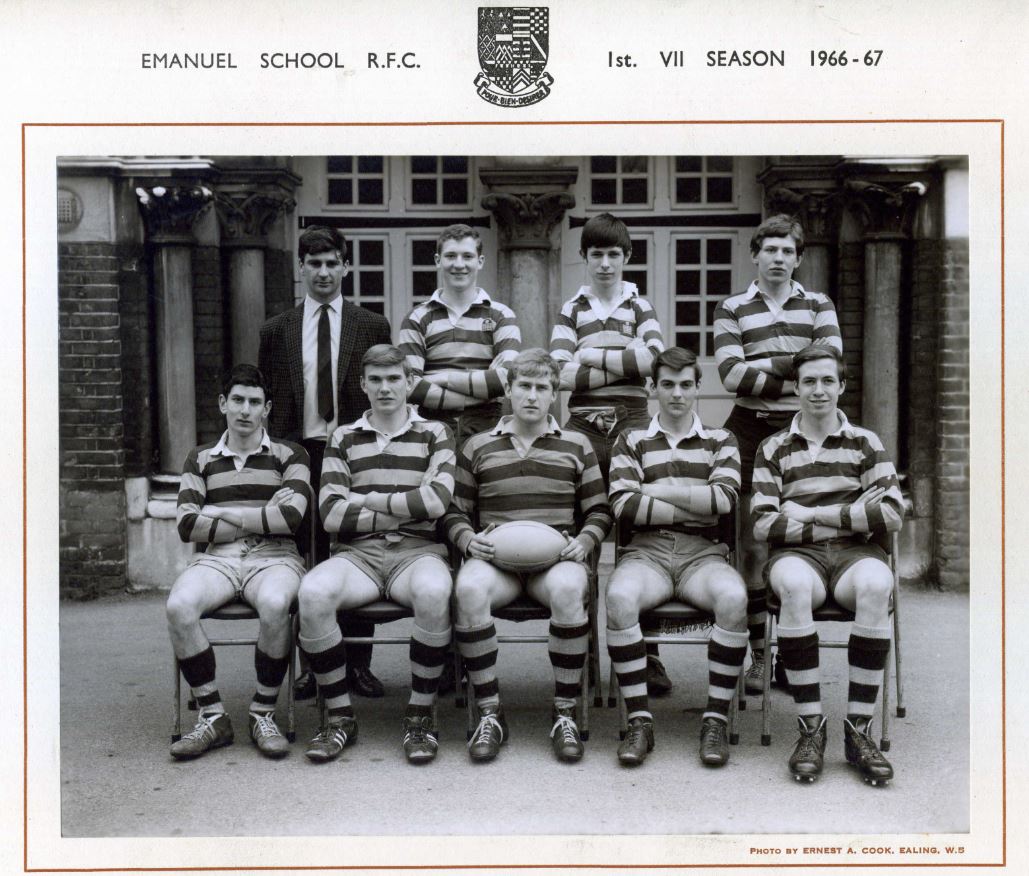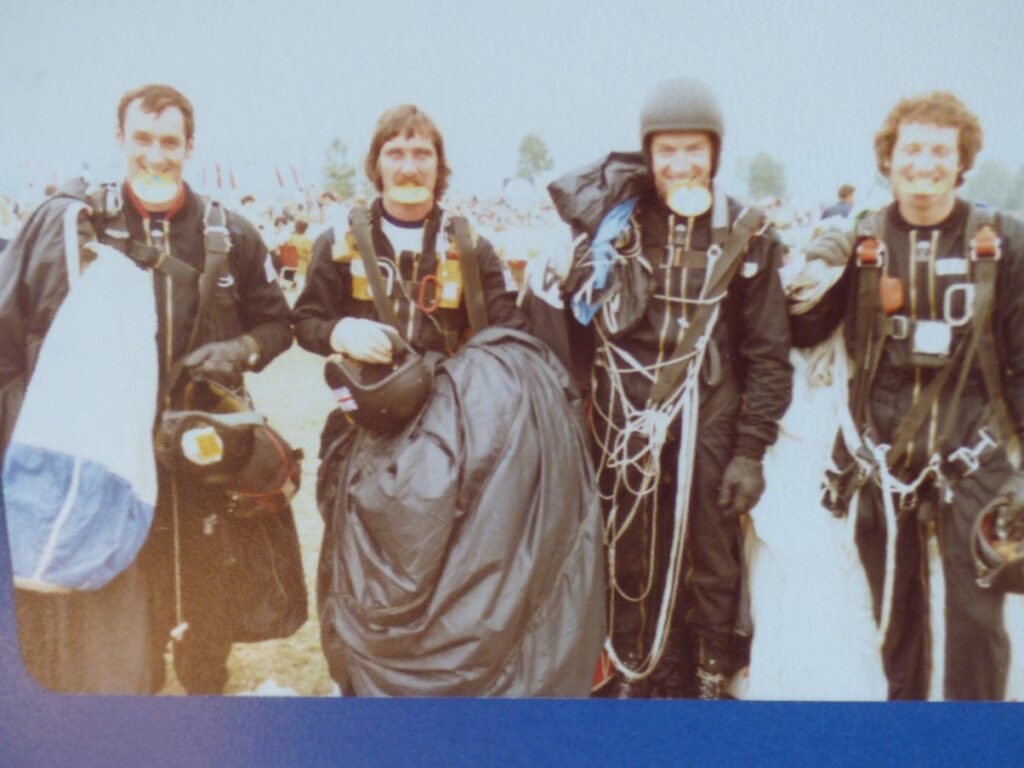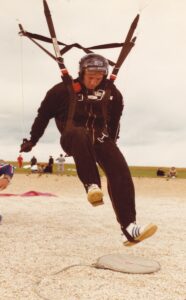OE Paul Slaughter has had a varied, interesting and impressive career. He trained in the Metropolitan Police and joined the parachute club there, going on to represent Great Britain in parachuting. He has also worked as a Close Protection Officer and run his own security firm for many years. He was an Investigator on the London riots in Peckham, security manager for the 2012 Olympics and has worked on countless Police investigations, including Operation Yewtree, the Savile enquiry.
Our Archivist, Tony Jones, caught up with Paul to find out more about his colourful life.
“I attended Emanuel School from Highfield Preparatory School, Wandsworth, which was a bit like a feeder prep for Emanuel. My first recollection was the interview with the Headmaster, Dr Grundy, a very imposing man. Although I passed the Eleven Plus, I was not that bright in relation to other students and found sport to be my saviour. Joining the CCF was great and becoming CQMS of the Army section was a highlight. I remember travelling by public transport carrying a .303 rifle on the train with dozens of other military-clad teenagers to exercises and camps. I loved every minute of it. The House system was also a major strength, as it instilled loyalty and competitiveness and I became House Captain of Howe.

Above: 1966 CCF Officers and NCOs. Paul is pictured in the third row, far right.
My academic achievements were not really of great significance as I concentrated more on sport, particularly rugby and cricket. For some reason, one of the sport Masters, Paul (Joe) Craddock decided that I had to play cricket, which I reluctantly accepted as I really wanted to play rugby and he was the rugby coach as well. Anyway, during one fielding practice session, he pulled me out of the field and told me to put the wicket keeping pads on. During my first game, I let forty byes through, the second only twenty and so on, until I got mad if one went through. I ended up playing for the First XI for three years, breaking the wicket record for dismissals in my last year. I was selected to play for Surrey Cricket Club Colts and Young Amateurs in 1968 and was offered a contract by then coach Arthur McIntyre, (ex-Surrey and England wicket keeper), but my Dad would not agree as he thought there was no future in professional cricket in the seventies. I carried on playing for Old Emanuel, then Sanderstead and finally Outwood, until I retired in 2017.
My rugby career was inspired by another sports master, Tony Phillips, who was a great mentor, especially as I had a major family trauma when I was sixteen. He was the only master who genuinely took any interest and helped me through a bad time. I was Captain of both XV and VII sides, taking over from Terry Lanchbery (OE1960-67); again, I was selected to play for Surrey Schools in 1967 and 68 and played a few games for Harlequins (very) lower sides, as well as Old Emanuel.

Above: Emanuel School 1st VII rugby team, 1966-67
I joined the Metropolitan Police in 1969 at Hendon and was posted to ‘H’ Division, in the East End of London, mainly because of rugby as ‘H’ was a very strong rugby team and the Chief Superintendent at Hendon was an ex ‘H’ player. I played for the Met Police for about four years, including their first team as scrum half and even toured America in a team which also featured Tony Boddy (OE1959-65). I then found that the Police had a parachute club and as my Dad was ex-Parachute Regiment, I decided to have a go.
I immediately loved it and progressed to compete in the National Championships for several years. In the meantime, I had joined the Criminal Investigation Department, where I was posted to Limehouse Police Station to ‘learn the trade’ as a young trainee detective. I was made a substantive Detective Constable and went to Hendon for a ten-week CID course and immediately after I passed the Sergeant’s exam, 35th out of 650, was promoted to Sergeant under the interchange scheme, which meant all those newly promoted had to revert to uniform for a year, but later revert to the CID. I was transferred to Carter Street in South East London, which was the busiest inner London station for crime reporting.
My parachuting took priority, sport overtaking everything else, and in 1968 I saved up enough time and went to the US to train at the foremost parachute school in the western hemisphere and also learned how to fly. It was run by a former US Marine Sergeant Gene Paul Thacker, a really hard man who coached people from the US, Canada and the UK and was renowned for turning average ‘jumpers’ into world class competitors. Upon returning to the UK, I competed in the National Championships but on my fifth or sixth jump, I badly twisted my ankle putting me out of contention. It took a good six months for my ankle to heal.
In 1980 I was awarded a Winston Churchill Travelling Fellowship to travel to and train with the American Special Forces with Thacker for three months, whilst still on Police pay. Upon returning to the UK, I entered the National Championships and performed well enough to get selection for the national team, with five others. We went back to the US for a period of intensive training and then onto Bulgaria for the XV World Championships. I ended up twentieth out of 160 international jumpers, competing in accuracy, (hitting a 10cm disc and free fall manoeuvres called “style”, judged for speed and accuracy, completing 360’ turns and somersaults, whilst falling at 160 mph).
The following year, I was again selected to represent Great Britain, this time at a European Championships in Strasbourg, where we became team champions. One of our guys won the accuracy and I came twelfth. The centre disc had been reduced to five centimetres now, as everyone had been hitting the 10cm too often. I am pictured on the right of the photo; all the other guys are Parachute Regiment. I did a total of 1253 sport jumps and 17 military jumps.


Above, left: Team in one of the World Championship rounds. Right: Concentrating while hitting the disk.
Upon return to the UK, I found that I had missed a posting to the Serious Fraud Squad due to my continued absence. I had passed the Inspector’s exam, (but not high enough for promotion, as it was a competitive procedure). I was then contacted by a former Special Forces guy, (from parachuting) to see if I would be interested in becoming a Close Protection Officer working for an NGO looking after UK business individuals working on behalf of the Government. I decided to take the plunge and joined them, starting off with some training, unarmed combat, escort drills and weapon handling, then as part of a six-man team, finally becoming a team leader and liaison with UK Embassies and High Commissions prior to arrival of the Principal.
I did this for ten years, then decided that I was getting too old for such enterprises, so founded my own company TASK Security International Ltd, building it up from nothing to employing over twenty staff. Our first contract was to travel to Liberia and assist the Government part-owned mining company during a civil war. The then president, General (self-appointed) Samuel Dow was fighting a war with two rebel groups, led by Prince Johnston and Charles Taylor. I travelled with my former SAS Sergeant Major, David Patterson, to assess the safety of the mine workers in Yepeka, north Liberia and arrange suitable measures at the camp and on railway transport which had been attacked several times during the previous month.
Upon arrival, we had to fly back to Monrovia to liaise with the Minister, Emanuel Shaw, who was a Director of the company. Upon landing, we were arrested, including our pilot Moti Shapiro, an Israeli former Air Force soldier, “interviewed” by the President’s guard and after persuading them that we were on their side, escorted to the Minister’s house. At his residence, a hand delivered note stated that he would be attacked that night and we agreed to protect him until the morning. Armed with an AK47, we pretended to lay land mines and booby traps in his garden, then stayed up trying to keep alert. In the morning we flew back to Yepeka and after discussing matters with the mine boss, decided to evacuate all mine workers and their families (36 cars), driving 200 miles north into Guinea and then the Ivory Coast, where David and I flew home.
I was then appointed a kidnap negotiator for Heritage Insurance to handle ransom demands in Colombia for its clients. I handled three cases, the most interesting of which was dealing with the National Liberation Army (ELN), when I met the leader Padre Pierto in the central Colombian jungle where we handed over the ransom fee, but were held for three days, “in comfort”, until the victim was released into our care.
During that time of fifteen years, I travelled a lot to the Caribbean, Middle East, Far East, Russia and South Africa, winning contracts to train Police and Military Close Protection teams, culminating in a Foreign Office contract training the Royal Malaysian Police close protection and hostage rescue teams for the XVI Commonwealth Games in Malaysia and then the training of security personnel for the Cricket World Cup of 2006 in the Caribbean. We trained several overseas Police forces, including Trinidad and Tobago, Bahamas, Jamaica, South Africa, St Petersburg, Russia, hostage rescue, Nigeria, and others.
In 2005, we were approached by venture capitalists who made my partner and I an offer, which we accepted and sold the company. After ten months I had a big bust up with them, as they would not listen to how to run TASK and left. After ten months I resigned, finding out that a year later it folded and went into liquidation. What is the German phrase for laughing at someone else’s misfortune?
After a spell travelling for eighteen months, I then worked as a civilian investigator for Surrey Police, (twice), Police recruit trainer for the Metropolitan Police (twice) and report writer for the British Transport Police for a historical allegation of murder which was being investigated for the eighth time. I was an Investigator on the London riots in Peckham, and Venue Security Manager for the 2012 Olympics in the Olympic Park, Stratford, managing to get into the main arena to watch Mo Farrah and Usain Bolt compete.
Over this period, I worked on many other investigations, including Operation Yewtree, the Savile enquiry, interviewing victims of abuse from as long ago as fifty years. I then moved to a Met Police “Sapphire” team in Lewisham investigating rape and serious sexual offences, followed by a stint at the Serious Fraud Office with a “public interest” enquiry, for six months, the most boring contract I was involved in. I was then selected to join the City of London Police Economic Crime Department, money laundering team, where I was the officer in charge of a multi-million pound “boiler room” fraud with over 300 victims, to investigate the major money launderer handling the proceeds. These contracts may not be in the right order, but all the notes are correct, to quote Eric Morecambe!
My last contract was in Woking, Surrey, on Operation Ravine, another historical child sex abuse enquiry, reinvestigating Jonathan King, the music promoter and three other suspects. I finally retired in 2017 moving up to Cheshire, but decided to undertake a Master’s Degree in Criminology and Criminal Psychology with University of Essex (2019), adding to my Law Degree from University of London (2001).
I am still active in sport playing badminton with Cheshire over 65s and regularly represent my local club in Cheshire leagues and competitions.”













